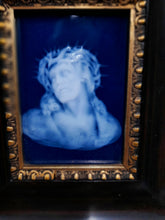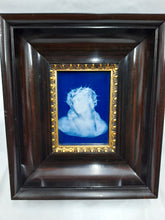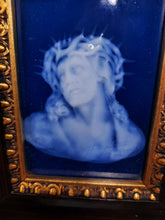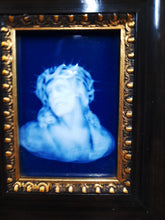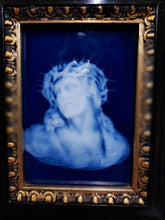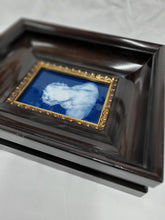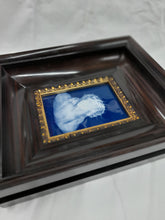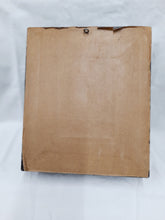
Marcel Chaufriasse Limoges Porcelain Pate-Sur-Pate Plaque, Portrait of Christ With The Crown Of Thorns Signed By The Artist
This plaque in beautiful deep blue with translucent porcelain slip painted on it by the famous artist Marcel Chaufriasse, acknowledged to be one of the very finest exponents of this type of pate sure pate artistry.
It is quite simply breathtaking. The skill and artistry required to produce a work of this quality are almost beyond words and definitely beyond photography. To really appreciate this you have to see it, hold it, feel it. Magnificent. Hauntingly beautiful.
Chaufriasse has created a masterpiece in porcelain. The plaque has then been set into a deep, beautifully gilded frame.
It is easy to see why work by Chauffriasse comands such high prices at auctions such as Christies and Bonhams in London.
The plaque measures approximately 12 cm by 9 cm. I say 'approximately because I have not removed it from the frame so cannot measure it accurately. Including the frame it measures 21 cm by 18 cm and the frame is just over 3 cm deep.
Pâte-sur-pâte is a French term meaning "paste on paste". It is a method of porcelain decoration in which a relief design is created on an unfired, unglazed body by applying successive layers of white slip (liquid clay) with a brush. The effect is somewhat similar to other types of relief decoration such as Jasperware, but as a mould is not normally used, the artist is able to achieve translucency.
To understand pâte-sur-pâte fully, we need to go back to France in the 1850s, and an accident that occurred at the Manufacture nationale de Sèvres. They were trying to reproduce a decorative technique from a Chinese vase, but misinterpreting the vase, the experiment took them along an altogether different path from the Chinese potter. Be it luck or fate they perfected what became universally known as pâte-sur-pâte.
The operation involves painting a thin wash of slip onto a coloured but unfired piece of porcelain. Subsequent layers, sometimes in different colours, are added when the earlier layers are dry, gradually, sometimes over weeks or months, building up a design in varying thicknesses and intensities.
The design can then be sharpened by engraving and the piece fired.
The technique was developed at Sevres c1850-75 by Marc-Louis Solon. At the outset of The Franco-Prussian war Solon fled France and joined the Minton Factory in England and continued his work there.
Limoges porcelain is rightly famous throughout the world for the quality of its porcelain and the exquisite nature of the enamel work produced there over many hundreds of years.
This plaque in beautiful deep blue with translucent porcelain slip painted on it by the famous artist Marcel Chaufriasse, acknowledged to be one of the very finest exponents of this type of pate sure pate artistry.
It is quite simply breathtaking. The skill and artistry required to produce a work of this quality are almost beyond words and definitely beyond photography. To really appreciate this you have to see it, hold it, feel it. Magnificent. Hauntingly beautiful.
Chaufriasse has created a masterpiece in porcelain. The plaque has then been set into a deep, beautifully gilded frame.
It is easy to see why work by Chauffriasse comands such high prices at auctions such as Christies and Bonhams in London.
The plaque measures approximately 12 cm by 9 cm. I say 'approximately because I have not removed it from the frame so cannot measure it accurately. Including the frame it measures 21 cm by 18 cm and the frame is just over 3 cm deep.
Pâte-sur-pâte is a French term meaning "paste on paste". It is a method of porcelain decoration in which a relief design is created on an unfired, unglazed body by applying successive layers of white slip (liquid clay) with a brush. The effect is somewhat similar to other types of relief decoration such as Jasperware, but as a mould is not normally used, the artist is able to achieve translucency.
To understand pâte-sur-pâte fully, we need to go back to France in the 1850s, and an accident that occurred at the Manufacture nationale de Sèvres. They were trying to reproduce a decorative technique from a Chinese vase, but misinterpreting the vase, the experiment took them along an altogether different path from the Chinese potter. Be it luck or fate they perfected what became universally known as pâte-sur-pâte.
The operation involves painting a thin wash of slip onto a coloured but unfired piece of porcelain. Subsequent layers, sometimes in different colours, are added when the earlier layers are dry, gradually, sometimes over weeks or months, building up a design in varying thicknesses and intensities.
The design can then be sharpened by engraving and the piece fired.
The technique was developed at Sevres c1850-75 by Marc-Louis Solon. At the outset of The Franco-Prussian war Solon fled France and joined the Minton Factory in England and continued his work there.
Limoges porcelain is rightly famous throughout the world for the quality of its porcelain and the exquisite nature of the enamel work produced there over many hundreds of years.








